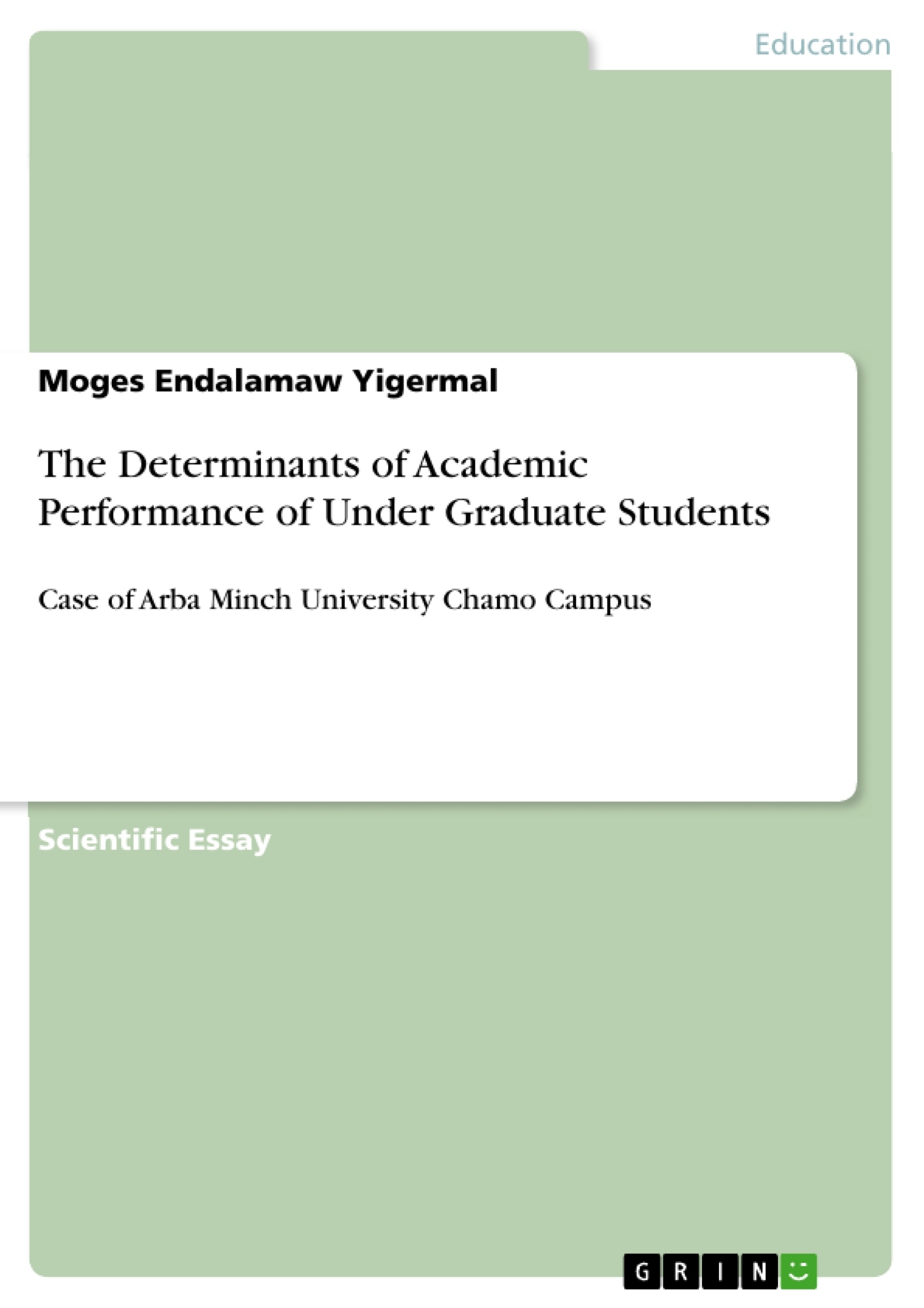The main objective of the paper is to investigate the determinant factors affecting the academic performance of
regular undergraduate students of Arba Minch university (AMU) chamo campus students. To meet the objective, the Pearson
product moment correlation statistical tool and econometrics data analysis (OLS regression) method were used with the aim of
establishing the relationship between factors related to student’s background and family background on academic performance
of regular undergraduate students at Arba Minch university chamo campus students. The findings proved the existence of
significant relationship between gender difference, university entrance exam, studying hours and academic performance
(CGPA). The findings also revealed that there was a significant relationship between students former academic back ground,
studying hours, and student’s behavior on taking of alcoholic drug and chat on academic performance of students. On the basis
of the findings, the researcher recommended that emphasis should be taken to improve the academic performance of female
students, working at the ground with high school students earlier before they joined in to university and Providing
Psychotherapy and supporting alcoholic drug and khat taker students to end the use such drug and Khat will bring more fruit to
improve students’ academic performance.
Inhaltsverzeichnis (Table of Contents)
- Introduction
- Back Ground of the Study
- Statement of the Problem
- Objective and Scope of the Study
- Working Hypothesis
- Literature Review
- Theoretical Literature Review
- Empirics
- Research Methodology
- Model Specification
- Variable Descriptions
- Data and Sampling Design
- Method of Data Analysis
- Result and Discussion
Zielsetzung und Themenschwerpunkte (Objectives and Key Themes)
This paper aims to investigate the factors influencing the academic performance of undergraduate students at Arba Minch University Chamo campus. The study focuses on identifying the relationship between student and family background characteristics and academic achievement, measured by CGPA.
- The impact of gender on academic performance.
- The influence of previous academic performance on university-level achievement.
- The role of family educational and economic background on student performance.
- The effect of student behaviors, such as drug use and sexual activity, on academic performance.
- The relationship between studying hours and academic achievement.
Zusammenfassung der Kapitel (Chapter Summaries)
- Introduction: This chapter provides background information about the importance of education in Ethiopia, highlighting the increasing enrollment rates and the concern over poor academic performance at university level. It presents the specific objectives and hypotheses of the study.
- Literature Review: This chapter reviews relevant theoretical and empirical literature on determinants of academic performance. It explores the relationship between various factors, such as gender, socioeconomic background, and study habits, and student achievement.
- Research Methodology: This chapter outlines the research methodology employed in the study. It describes the model specification, variable descriptions, data and sampling design, and data analysis methods used.
- Result and Discussion: This chapter presents the findings of the study. It analyzes the relationship between the identified factors and academic performance, discussing the significance and implications of the results.
Schlüsselwörter (Keywords)
The primary focus of this study revolves around academic performance, its determinants, and the use of OLS regression analysis. Key topics include gender differences, student and family background characteristics, study habits, drug use, and the impact of these factors on student achievement. The study also examines the role of university entrance exams and previous academic performance in predicting success at the university level.
Frequently Asked Questions
What are the main determinants of academic performance in this study?
The study identifies gender differences, university entrance exam scores, studying hours, former academic background, and substance use (alcohol and khat) as significant factors.
How does gender affect academic performance at Arba Minch University?
The findings indicate a significant relationship between gender and CGPA, leading to recommendations for specific support to improve female students' performance.
What is the impact of drug and khat use on students?
The research shows that behaviors such as taking alcoholic drugs and chewing khat have a significant negative impact on students' academic achievement.
Does the previous academic background matter for university success?
Yes, the study reveals a significant relationship between a student’s former academic record (high school performance) and their current university CGPA.
What statistical methods were used in this research?
The researcher used Pearson product-moment correlation and OLS regression (econometrics data analysis) to establish relationships between the variables.
- Quote paper
- Moges Endalamaw Yigermal (Author), 2014, The Determinants of Academic Performance of Under Graduate Students, Munich, GRIN Verlag, https://www.grin.com/document/414625



